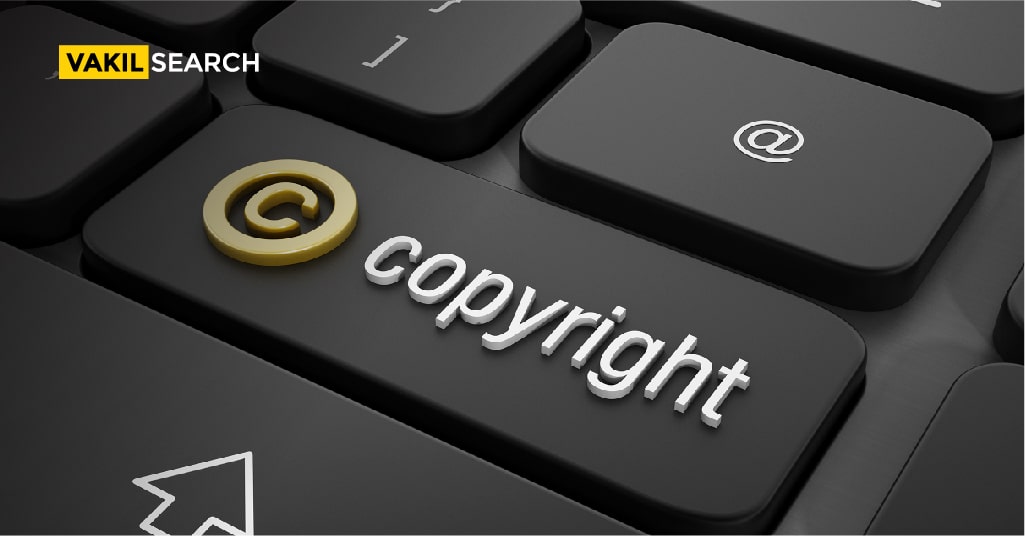This blog provides detailed steps on how to copyright a book in India. From understanding the nuances of book copyright to navigating the application process, it offers valuable insights. Learn about the crucial aspects of securing copyright for books, empowering authors to protect their intellectual property and gaining recognition for their creative endeavours.
When a person creates an official record of their property rights, this is known as infringing. Even if a person or company’s artistic output naturally belongs to them, copyrights are how they would establish it. Only the copyright owners have the sole right to produce reproductions, disseminate, publicize, and prepare derivative works based on the classic work as the proprietor of the artistic work.
In some countries, protected works must be fixed in a tangible medium. It is frequently divided among several authors, each of whom has several rights to use it or lease the works and is known as a content owner. Replication, ownership over creative works, dissemination, publicly performing, and ethical theories, including such credit, are all common examples of these freedoms. Read this blog to know about copyright of books in India.
Performance Rights in Copyright Law in India can be awarded by legislation and are somehow regarded as land sovereignty in this scenario. It implies that a copyright issued by a state’s statute does not go further than the boundaries of that government’s authority. Many nations, and often a large union of nations, have established deals with other countries on processes to be followed when projects cross national boundaries or when national interests conflict.
Copyrights often end 50 to 100 decades after the author dies under the legislation, according to the country. While some countries need certain copyright formalities, others recognize copyright in any work completed without requiring a formal register. When a work’s patents expire, it becomes publically available.
While no one else can profit from your object’s copying or dissemination, intellectual property does not apply to concepts or truths. Therefore, all copyrighted content must be in a tangible medium and become your original creation.
Why Should Your Book Be Copyrighted?
A patent can safeguard your book by proving its production and bolstering your case against third-party copyright violations. A trademark, for instance, can prohibit a bookshop from profitably producing and selling duplicates of your work. Copyright might also protect your work from being plagiarized by another writer.
Your creation of the work instantly secures your rights under copyright law if you’ve really gone through the formal publishing procedure or are consciously your books. Nevertheless, if you need to take some action against plagiarism and receive civil penalties in the United States, you must file Registration of Copyright after a job is completed.
You would require comprehensive documentation that you are the exclusive copyright holder or that another organization purposefully infringes on your book without the need for an excellent copyrighted work, which is more difficult to prove without previous awareness that the works already existed.
11 Steps to Copyrighting a Book
If you want to protect your work of literature in the country, you must file a copyright petition to the country’s copyright office. A step-by-step approach to infringing a book is provided below:
1. Go to the Copyright Office’s online webpage and Choose Registration of Copyright
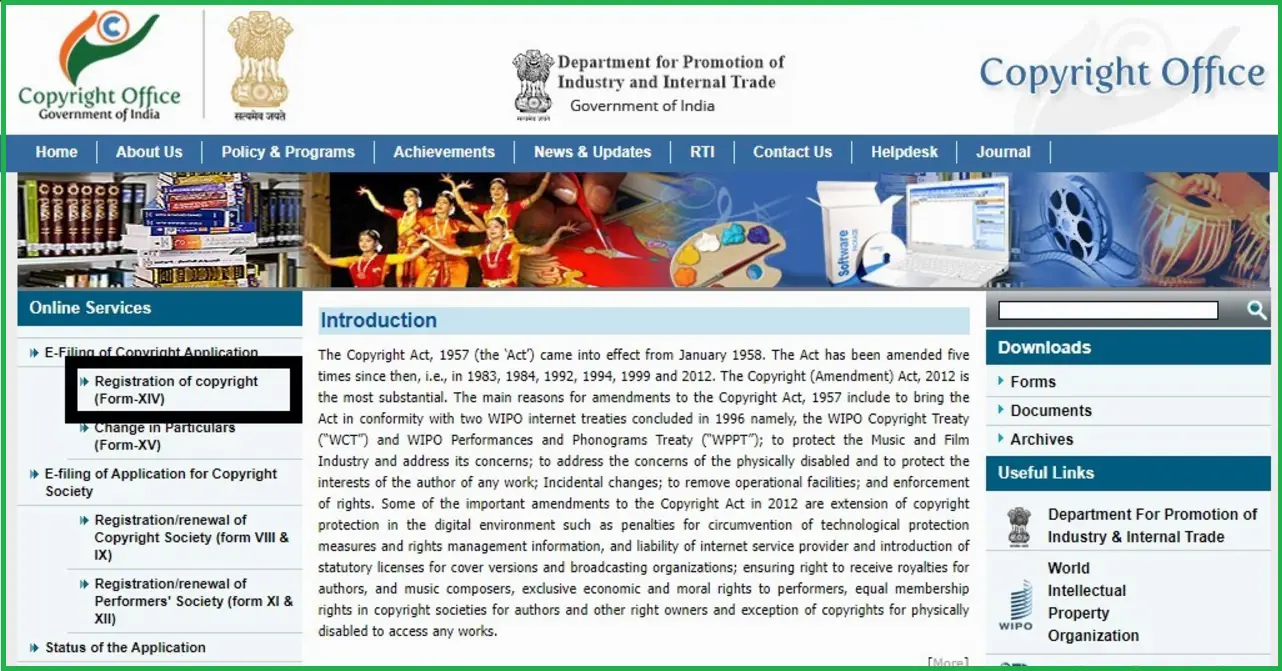
Copyright.gov.in is a website created by the National Library that enables you to fill out and file registration paperwork online by following a few simple steps.
2. Get User Registration
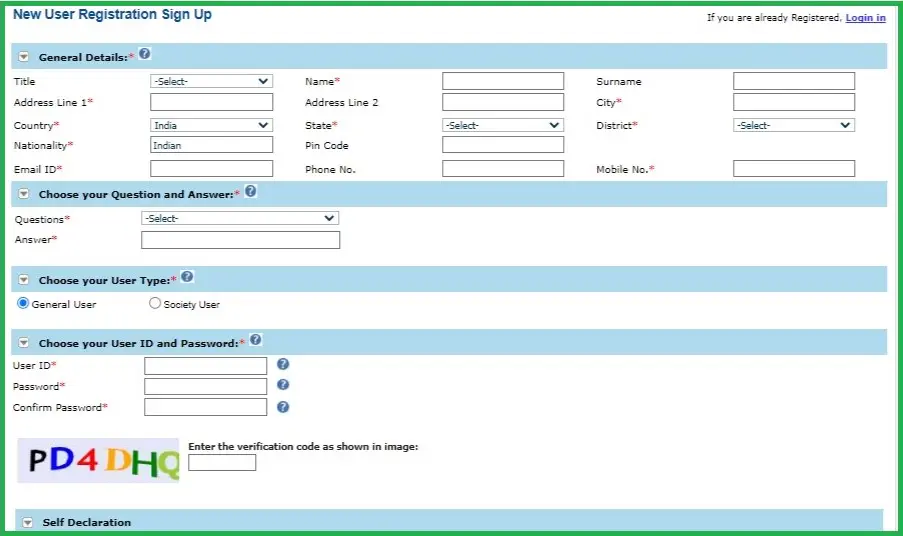
If you are a new user then you must get New User registration.
3. Login to goto user panel
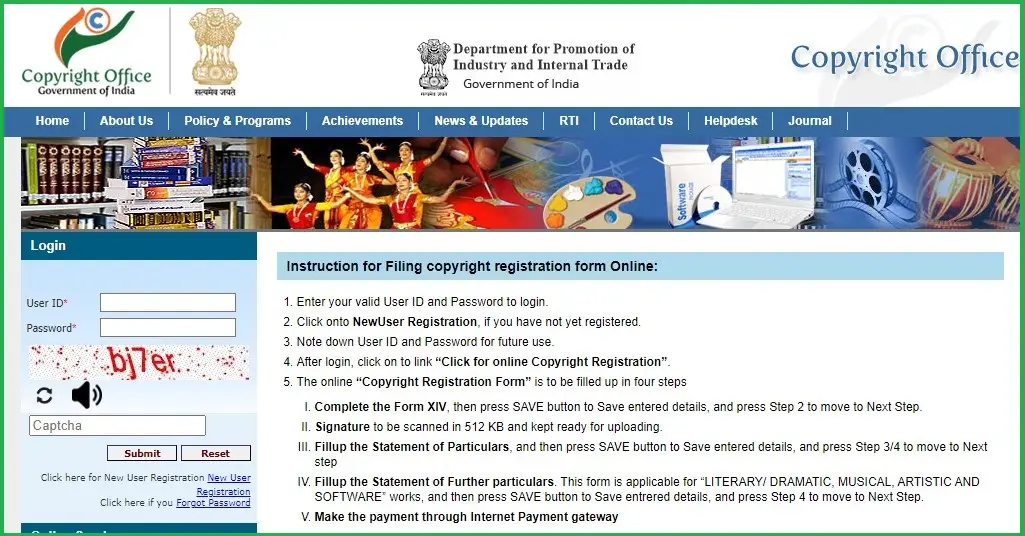
Copyright Official Website – LoginTo login enter your valid username and password
4. Click on “Click for online Copyright Registration
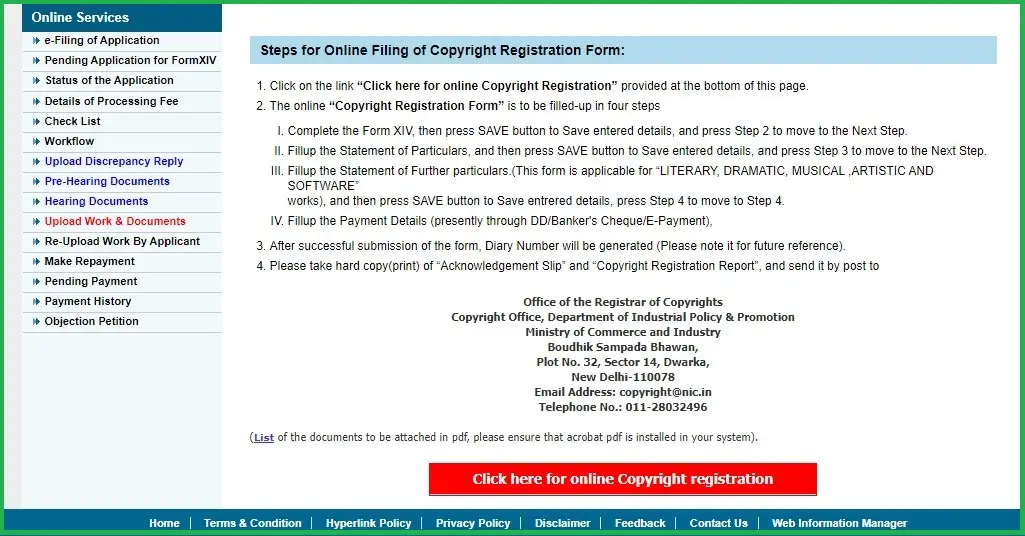
Click on “Click for online Copyright Registration to get started with application filling.
5. Fill the Application
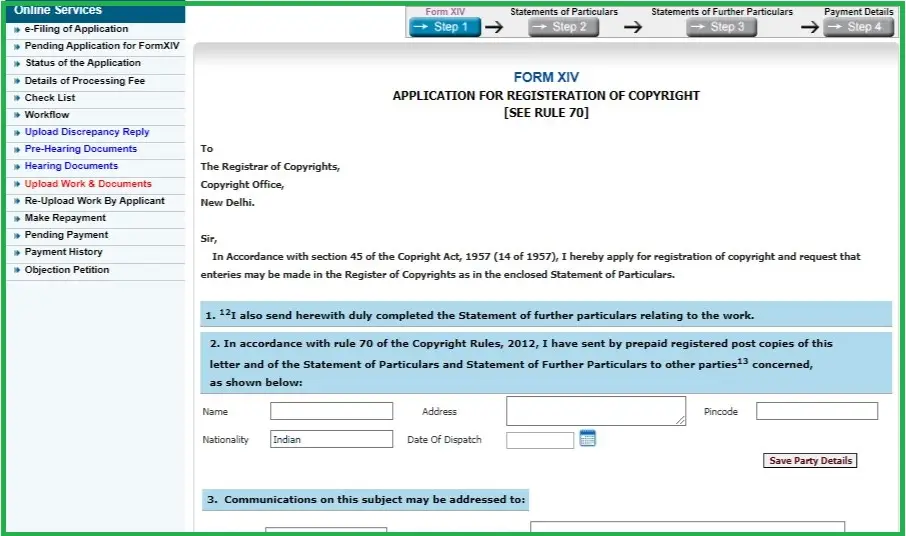
The application has 4 Steps fill them correctly, upload scanned signature, Fillup the Statement of Particulars.
6. Choose the appropriate category
Select ‘Literature Works’ from the ‘Create a Patent’ drop-down menu.
7. Set up an account on the internet
Open an account with the country’s copyright office if you don’t have one already to use the site.
8. Choose the Basic Application option
After you’ve signed in, go to the ‘Submit a Work’ section on the left side of the screen. Then, click the “Regular Form” link below that.
9. Complete the necessary paperwork
After clicking ‘Start Registering,’ fill out the form with all the necessary information about your book.
10. You must pay the money
Submit the application fee to the Country’s Copyright Administration.
11. Turn in your written work
Submit your book to the Country’s Copyright Office in its final refined form.
How To Include A Copyright Section In Your Book?
While attaching a rights page to your work will not give additional security, it will inform any readers that the book is protected. That should discourage them from trying to imitate this in the first instance. The section should include your identity, the year of publishing, an ISBN for identity, a reserve of rights, the book version, the trademark symbol, and a warning informing the readers that any advice or data gleaned from the book is solely at their own risk.
How Can a Book Be Copyright Protected?
It refers to how an author’s copyright is protected. A writer is required by copyright to keep workers safe and protected. Copyright prohibits bookstores from producing copies and afterward marketing the products without the person’s permission. Buyers are purchasing not just the book but also the author’s proprietary information, the plot, the people described in it, and all the associated settings.
The form of copyright a book is dependent on the type of the book. A telephone book, for instance, contains virtually little copyrighted content. Nevertheless, an essential list of information is included. While copyrights can apply to the ordering of the narrative, people in that specific narrative, or components of the larger world that it produces in a romantic novel, copyrights can also apply to the sequence of the storyline, people in that particular story, or parts of the wider world that it produces.
Information Required for Copyright Registration
The following information is required for copyright registration:
- The individual’s name, residence, and citizenship are personally identifiable. The individual’s nature, including whether or not he is the proprietor and agent of that specific application.
- Type of Work: Classification and description and the job’s title. The work’s languages should be mentioned in the request.
- Record date: If feasible, provide the publication date in periodic publications.
Advantages of Copyrighting a Book:
Protection of Intellectual Property:
Copyright serves as a shield, guarding an author’s intellectual property against unauthorized use, reproduction, or distribution. It grants exclusive rights, acknowledging creative ownership.
Legal Recourse and Enforcement:
Copyright provides a legal framework, empowering authors to take legal action against infringement. This ensures that authors have the means to enforce their rights and seek remedies for unauthorized use of their work.
Monetary Control:
Authors retain control over the commercial aspects of their work through copyright. They can negotiate royalties and licensing agreements, allowing them to benefit financially from the utilisation of their creative endeavours.
Creative Control:
Copyright empowers authors to maintain creative control over their work. They have the authority to prevent alterations or adaptations without their explicit consent, preserving the integrity of their artistic expression.
Market Exclusivity:
Copyright grants authors exclusive rights to reproduce, distribute, and display their work. This exclusivity provides authors with a competitive advantage in the market, allowing them to dictate how their creations are used.
Duration of Copyright on a Book:
Lifetime of the Author:
Copyright protection typically spans the lifetime of the author and extends for a specified number of years beyond the author’s death. This ensures that the author’s heirs or estate can continue to benefit from the work.
Fixed Duration:
Copyright protection has a predetermined, fixed duration beyond which the work enters the public domain. This fixed term provides clarity on the duration of legal protection for the author’s creation.
Renewal and Extension:
Some jurisdictions allow for the renewal or extension of copyright protection under specific conditions. This provision ensures that authors may seek continued protection for their work beyond the initial term.
Public Domain:
Once the copyright expires, the work enters the public domain, meaning it is no longer under copyright protection. This allows for unrestricted use by the public, fostering accessibility and cultural contributions.
Varied Terms:
Copyright duration may vary internationally, with different countries imposing distinct terms and conditions. Authors need to be aware of these variations to navigate the global landscape of copyright protection effectively.
Conclusion
Above all, it is hoped that the information on registering a book in India will assist you in registering your rights in India. You can keep your incredible plot, characters, and data protected. No one can duplicate your abilities. Copyright safeguards how you present something in your work in a particular manner. It indicates that copyright law is there to protect “idea communication.”
Also Read:
